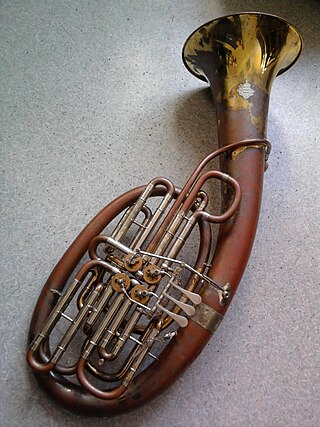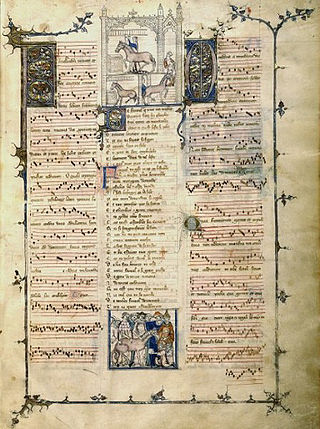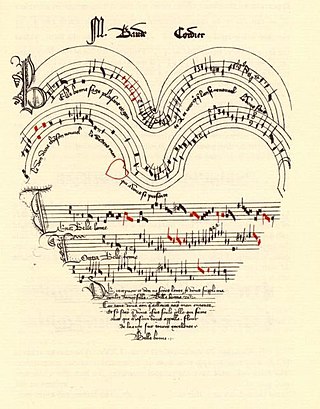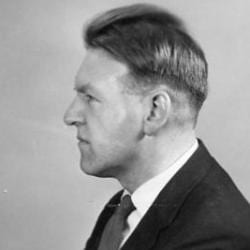
The Wagner tuba is a four-valve brass instrument named after and commissioned by Richard Wagner. It combines technical features of both standard tubas and French horns, though despite its name, the Wagner tuba is more similar to the latter, and usually played by horn players. Wagner commissioned the instrument for his four-part opera cycle Der Ring des Nibelungen, where its purpose was to bridge the acoustical and textural gap between the French horn and trombone.

Ars nova refers to a musical style which flourished in the Kingdom of France and its surroundings during the Late Middle Ages. More particularly, it refers to the period between the preparation of the Roman de Fauvel (1310s) and the death of composer Guillaume de Machaut in 1377. The term is sometimes used more generally to refer to all European polyphonic music of the fourteenth century. For instance, the term "Italian ars nova" is sometimes used to denote the music of Francesco Landini and his compatriots, although Trecento music is the more common term for the contemporary 14th-century music in Italy. The "ars" in "ars nova" can be read as "technique", or "style". The term was first used in two musical treatises, titled Ars novae musicae by Johannes de Muris, and a collection of writings attributed to Philippe de Vitry often simply called "Ars nova" today. Musicologist Johannes Wolf first applied to the term as description of an entire era in 1904.
Richard Farrant was an English composer, musical dramatist, theater founder, and Master of the Children of the Chapel Royal. The first acknowledgment of him is in a list of the Gentlemen of the Chapel Royal in 1552. The year of his birth cannot be accurately determined. During his life he was able to establish himself as a successful composer, develop the English drama considerably, found the first Blackfriars Theatre, and be the first to write verse-anthems. He married Anne Bower, daughter of Richard Bower who was Master of the Chapel Royal choristers at the time. With Anne he conceived ten children, one of whom was also named Richard.

Baude Cordier was a French composer in the ars subtilior style of late medieval music. Virtually nothing is known of Cordier's life, aside from an inscription on one of his works which indicates he was born in Rheims and had a Master of Arts. Some scholars identify him with Baude Fresnel, a harpist and organist in the court of Philip the Bold, though other scholars have rejected this.
George Michael Sinclair Kennedy CBE was an English music critic and author who specialized in classical music. For nearly two decades he was the chief classical music critic for both The Daily Telegraph (1986–2005) and The Sunday Telegraph (1989–2005). A prolific writer, he was the biographer of many composers and musicians, including Vaughan Williams, Elgar, Barbirolli, Mahler, Strauss, Britten, Boult and Walton. Other notable publications include writings on various musical institutions, the editing of music dictionaries as well as numerous articles for The New Grove Dictionary of Music and Musicians and the subsequent Grove Music Online.
Carl Michael Alfred Steinberg was an American music critic and author who specialized in classical music. He was best known, according to San Francisco Chronicle music critic Joshua Kosman, for "the illuminating, witty and often deeply personal notes he wrote for the San Francisco Symphony's program booklets, beginning in 1979." He contributed several entries to the New Grove Dictionary of Music and Musicians, wrote articles for music journals and magazine, notes for CDs, and published a number of books on music, both collected published annotations and new writings.

The Ospedale degli Incurabili is a large sixteenth-century hospital building on the Fondamenta delle Zattere, in the sestiere of Dorsoduro, in Venice in north-eastern Italy. Today it is occupied by the Accademia di Belle Arti di Venezia. It was built in the second half of the sixteenth century; the church – which no longer exists – may have been designed by Jacopo Sansovino.
This is a list of notable events in music that took place in the 1460s.

Gilbert Reaney was an English musicologist who specialized in medieval and Renaissance music, theory and literature. Described as "one of the most prolific and influential musicologists of the past century", Reaney made significant contributions to his fields of expertise, particularly on the life and works of Guillaume de Machaut, as well as medieval music theory.
Henry Loosemore was an English organist and composer who served as organist of King's College, Cambridge from 1627 until his death.
Richard Browne was an English composer and organist. He is known for his anthems; five of which survive: Christ rising again; If the Lord himself; I have declared; My God, my God, look upon me; and O Lord, rebuke me not in thy fury. 17th century documents of these anthems are part of the collection at the Bodleian Library, the Chained library at Wimborne Minster, the library of the Gloucester Cathedral, and the library of the Royal College of Music.
Richard Browne was an English composer and organist associated with the Worcester Cathedral. Three of his anthems are included in John Barnard's The First Book of Selected Church Musick (1641): By the waters of Babylon; If the Lord himself; and Unto him that loved us. Browne was a chorister at Worcester Cathedral in 1639, and was appointed lay clerk at that cathedral in 1642. In 1644 he was appointed a minor canon at the cathedral. He was promoted to organist and Master of the Choristers at the Worcester Cathedral on 26 April 1662. He remained in that post until his death two years later in August 1664. He was buried on August 27, 1664.
Richard Browne was an English composer and organist. He is not to be confused with two other English composers of the same name, Richard Browne and Richard Browne (c.1630–1664).
Richard Carter was an English violinist and composer.